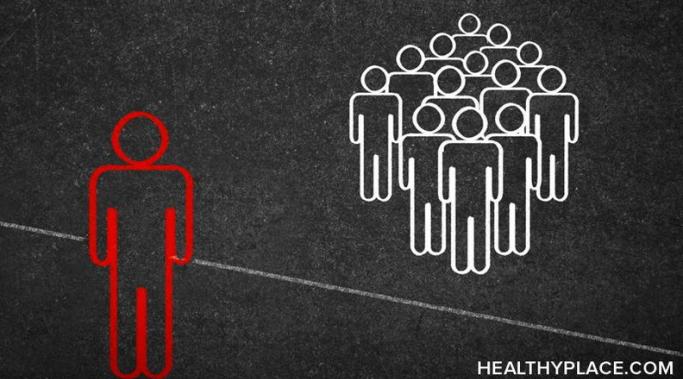Blogs
For many on the path to building self-esteem traditional therapy hasn't worked. Learn how unique and effective approaches can build self-esteem and change your life.
It's Halloween, and for mental health consumers, it can be an isolating time. The stigma of mental illness is reinforced with every "haunted asylum" attraction, "hanging man" decoration and "mental health patient" costume. More Than Borderline's Becky Oberg talks about how Halloween often reinforces negative stereotypes about mental health consumers, such as "they're violent," "they're deranged," and "they have no control over their actions."
For many people with bipolar disorder, there comes a point where they look at their lives and realize: their lives are so messed up. Often employment, family, friends, hobbies, financial welfare and many other things have been harmed by an uncontrolled mental illness. I often hear from people in times like these and they want to throw up their hands and just give up. I can understand this. Sometimes a mess seems so big that we will never clean it up. But I’m here to tell you that no matter how messy your life may be, you can make it better.
Anxiety can be incredibly exhausting. Anxiety can us down physically and emotionally. One reason anxiety is so taxing is that, once in our mind, it takes almost complete control. Fears and worries grow and they stick. It’s a vicious cycle: anxiety makes us worry, and the more we worry, the bigger anxiety grows, and the bigger it grows, the more we worry. However, even when anxiety grows so large it threatens to consume us, there is a way to shrink it back.
Lately, I have found myself with some extra free time on my hands. Which isn’t a bad thing, except for the fact that when I have free time I tend to ruminate, and when I tend to ruminate, depressive thoughts and symptoms often come up. This left me searching out new ways to deal with my depression symptoms and discovering writing as an outlet.
Opening a book entitled Psychos on a Saturday evening in the bargain section of a local bookstore, I came across the rantings of an author that symbolizes the hatred and stigma that people with schizophrenia often face. The defining characteristic of the psychotic, according to this New York Times bestselling author, is a "lack of empathy" followed by deranged criminal behavior. This fundamental and obvious flaw into the nature of the psychotic is still perpetuated to the public, by authors with an abundance of both influence and ignorance.
A diagnosis of generalized anxiety disorder (GAD) or having panic attacks doesn’t automatically mean there will be a co-occurring diagnosis of depression. However, many people with an anxiety diagnosis do suffer from clinical depression, even if only from time-to-time. In my case, I have both bipolar and anxiety disorders. Like many others, I have found that serious anxiety can lead to depression.
I am in the interesting position of being both a family member of a mentally ill person and being mentally ill myself. It sometimes gives me a unique understanding into both sides of the issues that can arise between the ill person and their family members.
Recently I sat on a panel of mental health consumers. Our goal was to educate people about mental health through drama and a question-and-answer session. When it came my turn to speak, I said that some mental illnesses were more stigmatized than others, fully knowing this would be controversial. Much to my surprise, I saw several heads nodding in agreement!
During my time in the military I was conditioned to exercise in the early morning hours. Typically, I was in the gym with my fellow comrades by 04:30 and out by 06:30. We knew once we started work our time was no longer our own. Now, as a civilian, I choose sleep over getting to the gym before the aurora. This means if I want to stay physically active and fit, I have to make time during the day or after I depart the office.










I believe she will only be able to rid herself of her demons, and hopefully her BPD as well, when she's ready to confront the abuse of her father. If she can put the blame where it belongs, she may stop projecting that victim/perpetrator cycle on the present men in her life. These demons are a metaphor for the purgatory she has created for herself. That reality has consequences in the real world, but it need not be real in the tangible sense. Exorcising her demons will require the expenditure of real physical energy and probably the destruction of aspects of her personality. If this ever happens, and it's possible but not probable, then these demons will evaporate. They are only as real as one's personality is real. In short, reality is not the question, it's what you make of the things you feel to be real.